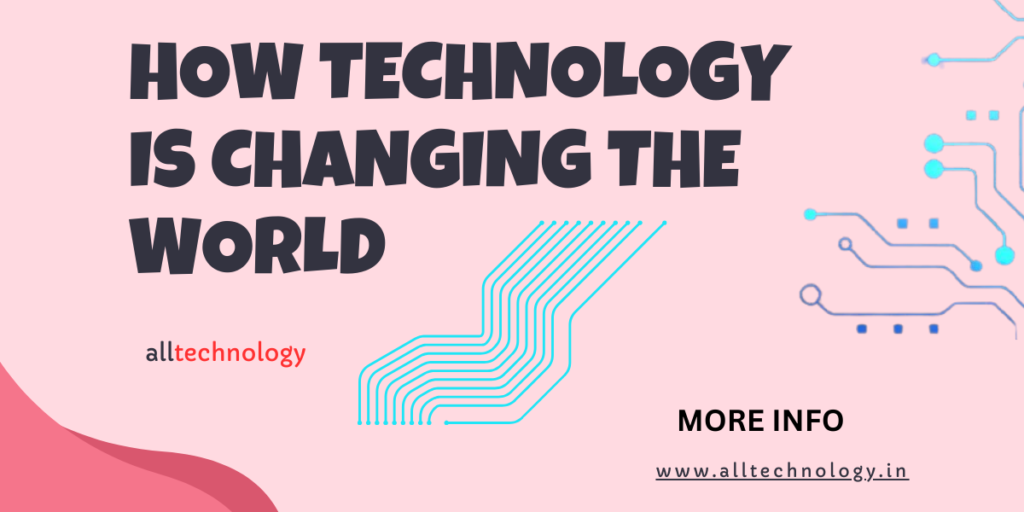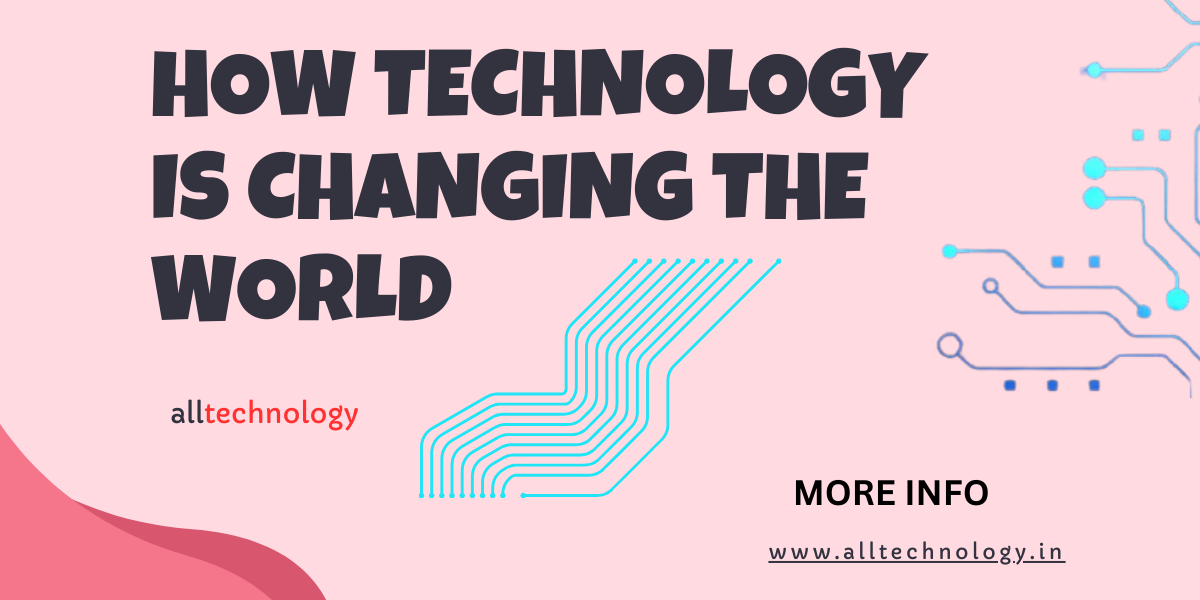Introduction
Hello Bloggers welcome alltechnology blog. In this blog you will learn How Technology is Changing the World. In an age marked by rapid advancements and relentless innovation, technology stands at the forefront of transformative change. Its pervasive influence spans across various aspects of our lives, embedding itself into the very fabric of our existence. When considering how profoundly technology is reshaping the world, two key concepts emerge as pivotal in understanding this phenomenon: perplexity and burstiness.

1. The Digital Revolution
In the blink of an eye, the digital revolution has uprooted traditional ways of life. Imagine, if you will, a world sans the internet—unthinkable, right? From smartphones to smart homes, digital innovations permeate every facet of our daily routines. We’ve moved beyond mere convenience; we’re now in an era where digital prowess dictates societal evolution.
2. Artificial Intelligence: The New Frontier
Artificial Intelligence (AI) isn’t just a buzzword; it’s a paradigm shift. Picture this: machines learning, adapting, and making decisions. AI drives our cars, curates our content, and even diagnoses illnesses. It’s as if we’re witnessing the dawn of a new species—one birthed from silicon and code.
3. The Internet of Things (IoT)
Our world is becoming increasingly interconnected, thanks to the Internet of Things (IoT). Consider your refrigerator knowing when you’re out of milk or your thermostat adjusting to your preferences without a second thought. IoT is weaving an intricate web, connecting devices in a seamless dance of data and efficiency.
4. Blockchain and Cryptocurrencies
Enter the realm of blockchain and cryptocurrencies, where transparency and security reign supreme. No longer are we solely reliant on traditional banking systems. Cryptocurrencies like Bitcoin and Ethereum are redefining financial paradigms, while blockchain ensures every transaction is immutably etched into the digital ether.
5. Advances in Medical Technology
The medical field has seen astonishing advancements, from robotic surgeries to personalized medicine. Imagine a surgeon in Tokyo operating on a patient in New York with robotic precision. This isn’t the future—it’s our present. Medical technology is not just saving lives; it’s extending them, enhancing them, and, in some cases, reimagining them.
6. The Evolution of Communication
Communication has evolved from smoke signals to instant video calls across the globe. Social media platforms have transformed how we connect, share, and interact. Information travels at the speed of light, bridging gaps and, sometimes, creating new ones. The world has become both vast and intimate, a paradox brought to life by technological marvels.
7. Renewable Energy Technologies
Amidst the growing concerns of climate change, renewable energy technologies offer a beacon of hope. Solar panels, wind turbines, and hydroelectric power are transforming how we generate energy. This shift not only reduces our carbon footprint but also paves the way for sustainable development. The future is green, powered by the relentless march of innovation.
8. Autonomous Vehicles
The rise of autonomous vehicles is redefining transportation. Imagine streets filled with self-driving cars, seamlessly navigating through traffic, reducing accidents, and transforming urban landscapes. This isn’t science fiction; it’s a burgeoning reality, promising efficiency and safety in equal measure.
9. Space Exploration and Technology
Space exploration is no longer the exclusive domain of government agencies. Private companies are charting new territories, making space travel more accessible. We stand on the cusp of a new era, where the final frontier is within our grasp, promising discoveries that could alter our understanding of existence itself.
10. The Impact on Employment
With technological advancements, the employment landscape is undergoing significant transformations. Automation and AI are reshaping job markets, rendering some roles obsolete while creating new opportunities. The challenge lies in adapting to this change, ensuring that the workforce is equipped with the skills needed for the jobs of tomorrow.
How Technology is Changing the World
The Unstoppable March of Innovation
Technology, an ever-evolving phenomenon, reshapes the fabric of our daily lives at an unprecedented pace. From the advent of the internet to the rise of artificial intelligence, each technological leap redefines possibilities, propelling humanity into realms once thought to be the stuff of science fiction. This relentless march of innovation brings with it a complex tapestry of changes, interwoven with both opportunities and challenges.
Connectivity and the Global Village
The internet, a colossal web of information and communication, has shrunk the world into a global village. No longer are we bound by geographical constraints; instant communication with someone on the other side of the planet is now a mundane reality. Social media platforms amplify voices, making the spread of ideas and information both rapid and far-reaching. However, this hyper-connectivity also fosters the rapid dissemination of misinformation, posing significant challenges to discerning fact from fiction.
Automation and the Future of Work
Automation, driven by advancements in robotics and AI, is revolutionizing the workplace. Routine tasks are increasingly handled by machines, enhancing efficiency and productivity. For instance, factories are now staffed with robotic arms that assemble products with precision and speed. Yet, this shift also raises concerns about job displacement and the future of human labor. As machines take over repetitive tasks, the workforce must adapt, acquiring new skills to thrive in an automated world.
The Promise and Peril of Artificial Intelligence
Artificial intelligence, with its ability to process vast amounts of data and learn from patterns, stands at the frontier of technological progress. AI-powered systems, from virtual assistants like Siri and Alexa to complex algorithms predicting market trends, are becoming integral to our lives. The benefits are manifold: enhanced convenience, improved decision-making, and even breakthroughs in fields like healthcare. However, the ethical implications of AI, including issues of privacy, bias, and autonomy, necessitate careful consideration and regulation.
Healthcare Revolution: Precision and Accessibility
In healthcare, technology is a double-edged sword, offering both precision and accessibility. Medical advancements, such as telemedicine, wearable health monitors, and genome editing, promise to revolutionize patient care. Telemedicine breaks down barriers to healthcare access, allowing remote consultations and continuous monitoring. Wearable devices track vital signs in real-time, enabling early detection of potential health issues. Meanwhile, CRISPR technology opens doors to gene therapy, potentially eradicating genetic disorders. Yet, these advancements also prompt ethical dilemmas and concerns about data security and patient privacy.
Environmental Impact: A Green Tech Renaissance
The environmental impact of technology is a subject of growing importance. Renewable energy sources like solar and wind power are being harnessed with greater efficiency, aiming to reduce our carbon footprint. Innovations in sustainable technology, such as electric vehicles and smart grids, promise a greener future. However, the production and disposal of electronic devices pose significant environmental challenges. Balancing technological progress with environmental stewardship remains a critical task for the global community.
Conclusion
As we navigate the tides of technological change, the importance of adaptability cannot be overstated. Embracing innovation while addressing the accompanying ethical, social, and environmental challenges is imperative. The future, shaped by technology, holds immense promise. By fostering a balance between progress and responsibility, we can ensure that the benefits of technology are realized while mitigating its potential drawbacks.
FAQ
Question 1. How technology has changed the world?
Access to energy, electricity, sanitation, and clean water have transformed the lives of billions.
Question 2. How does technology help us in the world?
How does technology make our lives easier? Technology lends immense support in automating various tasks, setting up reminders, communicating efficiently.

